It was one of the biggest comedy hits of the 1980s, returning close to $200 million when adjusted for inflation. Spawning six sequels, an animated TV series and constant talk of a big-screen resurrection, POLICE ACADEMY may not have received widespread critical acclaim – or in the case of its follow-ups, even a small amount of positive critical response – but it remains a viewer favorite, both for its wacky gags as well as its appealing assortment of rag-tag underdogs who triumph against all odds.
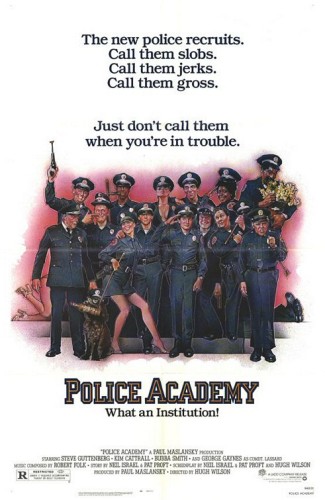 If you grew up in the ‘80s, you likely saw the series in one form or another, especially since the sequels progressively appealed to a younger demographic. That wasn’t the case necessarily with the original POLICE ACADEMY (***, 96 mins., 1984), which became a bona-fide, R-rated hit for the struggling Ladd Company, which had recently suffered a huge financial loss with “The Right Stuff.”
If you grew up in the ‘80s, you likely saw the series in one form or another, especially since the sequels progressively appealed to a younger demographic. That wasn’t the case necessarily with the original POLICE ACADEMY (***, 96 mins., 1984), which became a bona-fide, R-rated hit for the struggling Ladd Company, which had recently suffered a huge financial loss with “The Right Stuff.”
My first exposure to the film came when Chris Lee, an elementary school buddy of mine, rented the original – or I should say his parents did, at some point once the film hit VHS. Though the film was R-rated for a few raunchy gags and brief nudity, it apparently got the green-light from Chris’ folks, which was understandable seeing as the movie is positively tame compared to the standards of any modern comedy.
The Paul Maslansky production offers a series of colorful characters suiting up for the Police Academy – hungry to accept any new recruit – under the guidance of hapless Cmd. Lassarde (George Gaynes, Punky Brewster’s “Henry”) and domineering Captain Harris (“MASH” vet G.W. Bailey). The group includes smooth-talking Mahoney (Steve Guttenberg, who parlayed the film’s success into a number of ‘80s leading roles), gun-crazed Tackleberry (the wonderful, late David Graf), sound FX wizard Larvell Jones (Michael Winslow), quiet muscleman – and florist! – Hightower (Bubba Smith), and Marion Ramsey as the soft-spoken Hooks. Along for the ride – though only in this installment – are Kim Cattrall as the picture’s nominal female lead, though it’s surprising how little she has to do in the picture; Donovan Scott as corpulent Leslie Barbara; and Andrew Rubin as the smooth talking George Martin.
The group proves to be less than competent in going through the usual police drills, but eventually, they (of course) come together and even help out during an actual riot in the unnamed city the action takes place in (actually Toronto, where the majority of the “Police Academy” films were shot).
I hadn’t seen “Police Academy” in years when I opted to import Warner’s region-free Blu-Ray box-set of the series (it’s available in most markets outside the U.S.), and much to my surprise, director Hugh Wilson’s original film remains thoroughly entertaining. The first half offers the expected, “Stripes”-like shenanigans involving Mahoney and company causing havoc for Captain Harris, with Wilson – a veteran of “WKRP in Cincinnati” – moving the film right along, pacing the film briskly with little time to expand on the various characters (the six sequels would offer enough opportunities!) and focusing entirely on gags. The sheer momentum of the film, along with Robert Folks’ terrific, memorable score, helps to overcome the hit-or-miss humor in the script – written by Wilson from an apparently raunchier, early draft by “Bachelor Party” scribes Neal Israel and Pat Proft – though there are a few amusing moments (The Blue Oyster Club in particular) along the way. Guttenberg’s natural charisma also is a big asset, anchoring the comedically inclined supporting cast and displaying chemistry with both Smith and Winslow, who would have more screen time in subsequent adventures.
What surprised me particularly about the first “Police Academy” is the picture’s brief shift into something resembling a serious action climax in its concluding moments. No, it’s not especially heartpounding as the trainees find themselves in the midst of a real crisis, but it’s easy to see why the film played so well with audiences, as Wilson delivers an ending that’s treated just seriously enough to make it a legitimate crowd-pleaser. It’s not a laugh riot, but it’s an effective, trim piece of studio filmmaking that’s thoroughly likeable, especially when viewed today, and carried by Folk’s superb score.
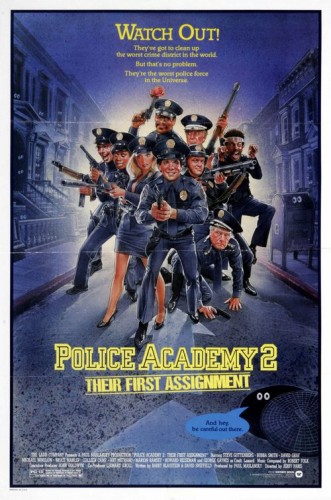 Grossing $81 million back in 1984 – the equivalent of $200 million by 2015 standards – “Police Academy” was an immediate hit. It didn’t save the Ladd Company, which ended its relationship with Warner Bros. the following year (selling off the series to WB in the process), yet the film’s impact trickled down to a number of similarly-themed comedies, including Neal Israel’s own “Moving Violations,” as well as a litany of sequels that would be produced for the duration of the decade.
Grossing $81 million back in 1984 – the equivalent of $200 million by 2015 standards – “Police Academy” was an immediate hit. It didn’t save the Ladd Company, which ended its relationship with Warner Bros. the following year (selling off the series to WB in the process), yet the film’s impact trickled down to a number of similarly-themed comedies, including Neal Israel’s own “Moving Violations,” as well as a litany of sequels that would be produced for the duration of the decade.
POLICE ACADEMY 2: THEIR FIRST ASSIGNMENT (***, 87 mins., 1985) is easily the best of the bunch. Taking advantage of the recently implemented PG-13 rating, this first sequel managed to tone down just enough of the raunch factor to enable kids back in the day (including yours truly) to get into screenings, opening up the series for younger viewers. In fact I firmly recall my viewing of the movie with my parents while we were on spring vacation in Florida back in April of ‘85, in a packed multiplex somewhere near Boca Raton.
“Happy Days” vet Jerry Paris took over from Hugh Wilson while SNL veterans Barry Blaustein and David Sheffield strayed from the formula of its predecessor sufficiently to create a comedic product that’s quite funny and far better than any of the films that followed it.
Here, the Academy graduates – Mahoney, Tackleberry, Jones, Hooks and Fackler – are brought into a tough precinct presided over by Cmt. Lassarde’s brother (Howard Hesseman, taking over for George Gaynes who appears only in a cameo), who’s trying to clean up the streets. The new recruits do battle with a not-quite-vicious gang leader, Zed, played by Bobcat Goldthwait in an inspired comic performance that led to the character being brought back in subsequent sequels. The supporting cast is likewise strong: Tim Kazurinsky, one-time SNL cast member and screenwriter of “About Last Night…”, generates a few laughs as a meek inner-city shop keeper; Colleen Camp makes an appearance as Tackleberry’s partner; and minus G.W. Bailey’s Captain Harris, Art Metrano serves up an inferior, even more outwardly comedic foil as the arrogant Capt. Mauser. Lance Kinsey, at least, is quite funny as Proctor, his brainless right-hand man.
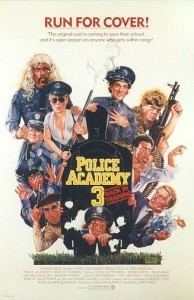 While there’s an episodic component to the film, and the movie’s budget seems lowered from the original, “Police Academy 2″ is actually very funny, with ample gags and a quick pace. Robert Folk’s wonderful scoring carries the film as well, adding in some exciting action cues and a sweeping love theme for Tackleberry’s whirlwind romance with his new partner (it’s too bad a boxed-set wasn’t released of Folk’s music for the various “Police Academy” sequels). “Police Academy 2″ opened March 29th, 1985 – nearly a year after its predecessor – and coasted to a $55 million gross, the equivalent of $125+ million in 2015 dollars.
While there’s an episodic component to the film, and the movie’s budget seems lowered from the original, “Police Academy 2″ is actually very funny, with ample gags and a quick pace. Robert Folk’s wonderful scoring carries the film as well, adding in some exciting action cues and a sweeping love theme for Tackleberry’s whirlwind romance with his new partner (it’s too bad a boxed-set wasn’t released of Folk’s music for the various “Police Academy” sequels). “Police Academy 2″ opened March 29th, 1985 – nearly a year after its predecessor – and coasted to a $55 million gross, the equivalent of $125+ million in 2015 dollars.
Outside of a few f-bombs, “Police Academy 2″ wasn’t as raunchy as its predecessor, establishing a trend that escalated further down to PG-level slapstick in POLICE ACADEMY 3: BACK IN TRAINING (*½, 83 mins., 1986). This shoddy follow-up tries to recycle elements of the original “Police Academy” – with the return of several cast members missing from the second sequel (Leslie Easterbrook, Debralee Scott, Scott Thomson, Brent Van Hoffman) – but fails on nearly every conceivable level.
The big problem is that the sequel has no flow. At barely 80 minutes plus credits, the film shows every sign of having been cut significantly, as many scenes seem to begin midway through their duration and abruptly end, arbitrarily going into the next gag. Perhaps there was good reason for the pruning, as what’s here isn’t funny in the slightest, but the finished product is arguably the worst of the entire series.
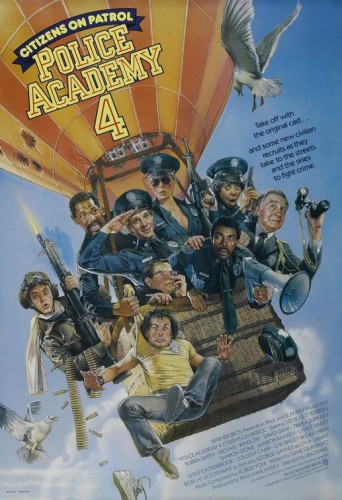 The script by Gene Quintano – a scribe whose credits ranged from Cannon’s “King Solomon’s Mines” to the Van Damme flop “Sudden Death” – finds Lassarde’s Academy going up against Mauser’s rival school in a competition to determine which outfit is best. Cue the original cast, who attempt to whip some of the new recruits into shape – these include half the cast of “Police Academy 2,” including Tim Kazurinsky’s meekly shop owner and Bobcat Goldthwait’s Zed. Regrettably, neither can muster any laughs, while even Steve Guttenberg’s Mahoney feels like an afterthought in a film that shamelessly recycles its predecessors’ gags and never finds a comfortable gear, all despite returning director Jerry Paris from Part 2. Even the end credits feel padded!
The script by Gene Quintano – a scribe whose credits ranged from Cannon’s “King Solomon’s Mines” to the Van Damme flop “Sudden Death” – finds Lassarde’s Academy going up against Mauser’s rival school in a competition to determine which outfit is best. Cue the original cast, who attempt to whip some of the new recruits into shape – these include half the cast of “Police Academy 2,” including Tim Kazurinsky’s meekly shop owner and Bobcat Goldthwait’s Zed. Regrettably, neither can muster any laughs, while even Steve Guttenberg’s Mahoney feels like an afterthought in a film that shamelessly recycles its predecessors’ gags and never finds a comfortable gear, all despite returning director Jerry Paris from Part 2. Even the end credits feel padded!
“Back in Training” nevertheless fared well at the box-office, bringing POLICE ACADEMY 4: CITIZENS ON PATROL (**, 87 mins., 1987, PG) to production quickly. This installment was once again written by Gene Quintano and offers a slight upgrade over its predecessor (with G.W. Bailey returning from a two-picture hiatus as Captain Harris), though especially here, one can sense the film being cut for maximum slapstick effect – favoring its increasingly juvenile audience – at the expense of any coherent story.
Steve Guttenberg is back for one last go-around as Mahoney, though in hindsight it’s hard to imagine why he bothered unless he had to fill out a contractual obligation. Mahoney makes just a few appearances in this romp, which finds the gang trying to train up a group of civilians, including “rad” skateboarders played by a clearly too-old David Spade and Brian Backer (best known as “Fast Times at Ridgemont High”’s Mark Ratner), for its “Citizens on Patrol” outreach program.
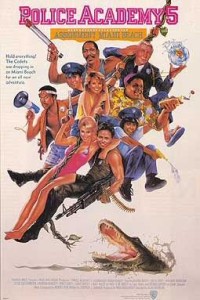 Sharon Stone fills the requisite female lead in “Citizens on Patrol,” but the editors junked nearly all of the scenes she shared with Steve Guttenberg, essentially rendering her role pointless in the process. A couple of their discarded bits are included in the disc’s deleted scenes (and were restored to the broadcast TV airings), but most of the film is focused on the assorted personalities of the “COP” participants, with Billie Burke generating most of the laughs as an elderly new recruit. Though the film is pretty blah – functioning as an uneventful send-off for Guttenberg and Bobcat Goldthwait’s Zed – the hot-air balloon action climax is, admittedly, well handled by director Jim Drake, ranking as one of the series’ most elaborate and effective set-pieces.
Sharon Stone fills the requisite female lead in “Citizens on Patrol,” but the editors junked nearly all of the scenes she shared with Steve Guttenberg, essentially rendering her role pointless in the process. A couple of their discarded bits are included in the disc’s deleted scenes (and were restored to the broadcast TV airings), but most of the film is focused on the assorted personalities of the “COP” participants, with Billie Burke generating most of the laughs as an elderly new recruit. Though the film is pretty blah – functioning as an uneventful send-off for Guttenberg and Bobcat Goldthwait’s Zed – the hot-air balloon action climax is, admittedly, well handled by director Jim Drake, ranking as one of the series’ most elaborate and effective set-pieces.
“Citizens on Patrol”’s box-office gross was $28 million – down sharply from Part 3’s $43 million, but more than good enough to keep the series going for a pair of follow-ups that would be released as the ‘80s drew to a close.
POLICE ACADEMY 5: ASSIGNMENT MIAMI BEACH (**, 90 mins., 1988, PG) dropped Mahoney and turned the series’ attention to the supporting cast, most of whom have more to do. It also offers a more developed (relatively speaking) story than its immediate predecessors, with the gang – in Miami to help celebrate Commandant Lassard’s award as “Police Officer of the Decade” – running into jewel thieves. Among the latter are veteran character actor/comedians Rene Auberjonis and Archie Hahn, who do – to their credit – amiably mug their way through Stephen J. Curwick’s script. There’s also a Mahoney fill-in, courtesy of Matt McCoy’s Nick (Lassard’s nephew), who gets to bat his eyes with female lead Janet (Gretzky) Jones.
 Moving back to its Toronto shooting locales, POLICE ACADEMY 6: CITY UNDER SIEGE (**, 84 mins., 1989, PG) is arguably the most entertaining of the later series efforts. Comic actor/director Peter Bonerz generates some laughs from the cast – here augmented with the return of Bruce Mahler’s hapless Fackler plus Kenneth Mars and Gerrit Graham as the bad guys – while Stephen Curwick’s script finds the gang trying to combat a rash of robberies across the city.
Moving back to its Toronto shooting locales, POLICE ACADEMY 6: CITY UNDER SIEGE (**, 84 mins., 1989, PG) is arguably the most entertaining of the later series efforts. Comic actor/director Peter Bonerz generates some laughs from the cast – here augmented with the return of Bruce Mahler’s hapless Fackler plus Kenneth Mars and Gerrit Graham as the bad guys – while Stephen Curwick’s script finds the gang trying to combat a rash of robberies across the city.
Though neither Parts 5 or 6 are particularly noteworthy, they’re amiable enough and fun for young (and nostalgic) viewers, with less disjointed story lines than the middle sequels of the series while Robert Folk’s scores lend a consistent, sturdy assist.
With rapidly declining receipts (“Miami Beach” netted $18 million and “City Under Siege” dove sharply to $11 million) and the series having migrated to its next natural destination – a silly animated series strictly for little kids – it looked like “Police Academy” had hung up its cuffs at long last.
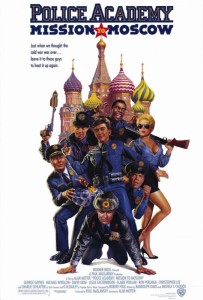 Producer Paul Maslansky and Warner Bros. opted to give it one more try, however, by utilizing post-Glasnost Russian shooting locales in the barely-released POLICE ACADEMY: MISSION TO MOSCOW (*½, 83 mins., 1994, PG).
Producer Paul Maslansky and Warner Bros. opted to give it one more try, however, by utilizing post-Glasnost Russian shooting locales in the barely-released POLICE ACADEMY: MISSION TO MOSCOW (*½, 83 mins., 1994, PG).
Other than allowing George Gaynes the ability to take top billing for the first time, this is a weak, belated series finale that sends Lassard and selected members of the original cast (Michael Winslow, David Graf, Leslie Easterbrook, and G.W. Bailey) to Russia in order to help apprehend a Russian mob boss (Ron Pearlman) who’s embezzling money under the guise of a Tetris-like video game.
It’s fun to see Christopher Lee and a pre-stardom Claire Forlani working together here, but beyond the novelty of its setting, “Mission to Moscow” is pretty feeble stuff. Warner Bros. understandably agreed, dumping the film out in a token, limited theatrical run in late August of ‘94 prior to sending it straight to video a few months later.
 Incredibly, despite its enduring popularity, the “Police Academy” series has yet to generate a Blu-Ray release in North America – all the more odd since Warner has released it already in virtually every other market worldwide. The six-disc, region-free set, which can be found at a fairly reasonable price in Germany, Italy and the UK, offers respectable 1080p AVC encoded transfers that haven’t been freshly remastered but are still leaps and bounds over the currently available U.S. DVD releases (several of which are 4:3 full-frame only). DTS MA mono audio (stereo on “Moscow”) is on-hand along with extras ported over from the DVD box set, including retrospective featurettes on each picture, trailers and deleted scenes on “Citizens on Patrol.” The boring, unattractive “modernist” packaging won’t win any awards, but it’s still worth importing if you’d rather not wait around for the inevitable U.S. version.
Incredibly, despite its enduring popularity, the “Police Academy” series has yet to generate a Blu-Ray release in North America – all the more odd since Warner has released it already in virtually every other market worldwide. The six-disc, region-free set, which can be found at a fairly reasonable price in Germany, Italy and the UK, offers respectable 1080p AVC encoded transfers that haven’t been freshly remastered but are still leaps and bounds over the currently available U.S. DVD releases (several of which are 4:3 full-frame only). DTS MA mono audio (stereo on “Moscow”) is on-hand along with extras ported over from the DVD box set, including retrospective featurettes on each picture, trailers and deleted scenes on “Citizens on Patrol.” The boring, unattractive “modernist” packaging won’t win any awards, but it’s still worth importing if you’d rather not wait around for the inevitable U.S. version.
Speaking of that, it’s likely that Warner Home Video is waiting for the long-gestating “Police Academy” revival (now in the hands of popular comics Keegan-Michael Key and Jordan Peele) to finally get underway before releasing the original series on Blu-Ray. Unfortunately, given all the much-discussed cases of alleged police misconduct across the country over the last year, it’s looking like fans will have to wait longer for the reboot – and, in turn, continue to wait for a domestic release of the original “Police Academy” in high-def.
NEXT TIME: TENTACLES, CHAPPIE and more! Until then, don’t forget to drop in on the official Aisle Seat Message Boards and direct any emails to our email address. Cheers everyone!
